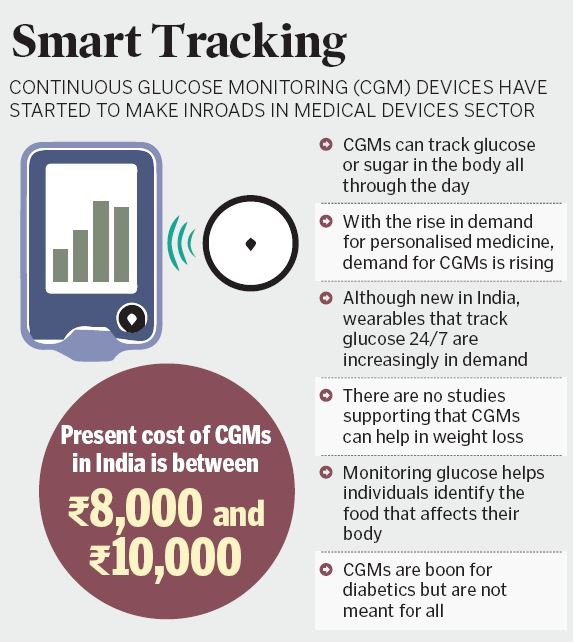Health and Tech: Sensor-based wearable to manage diabetes

Modern technology is transforming personalised medicine at a very quick pace. The days of pricking fingertips for a drop of blood to test glucose at home are quickly disappearing. In the near future, the elementary home testing devices to measure sugar levels could well be replaced by wearables that can track glucose/sugar in the body all through the day, without the need to prick the fingertip with the needle (lancet) for blood.
Yes, just like the smartwatch wearables that track heart rate, ECG and blood oxygen saturation levels in the body, medical device manufacturers and service providers have already started offering wearables, known as Continuous Glucose Monitoring (CGM) devices that track glucose levels in the body 24/7.
In fact, apart from monitoring glucose levels, companies have started offering special programmes related to CGMs that revolve around weight loss, tracking diet, exercise, tweaking lifestyle and impact of sleep on blood glucose levels.
So what are CGM devices?
The devices have been developed to empower diabetics to have the ability to monitor their sugar levels throughout the day. These are compact medical systems that come with small sensors (like a patch) that can be attached to the arm and they take glucose readings in the fluids that surround cells in the body. The sensors come with a limited life and they have to be replaced after the end of a week or two weeks.
Some companies also offer a mobile application along with the CGM, which breaks down the data and presents it in such a way that it could be understood easily. Quite often, these mobile apps alert the person, whenever there is an alarming spike in glucose levels.
Unlike the traditional glucose meters at home, CGM provides glucose data of the body every 5 minutes. So users, literally have access to real-time information of their glucose levels, which is quite empowering.
Is it the right time to switch to such devices and who should have them?
Experts point out that while such high-end medical devices could help patients but there is a need to be cautious. “There are many advantages of CGMs that can benefit patients. But, these devices are not meant for all and definitely they do not directly impact weight loss. The fact also is that CGMs do empower diabetics by allowing them to track their glucose levels all through the day. In fact, CGMs are also beneficial for people who are pre-diabetic,” Head, Endocrinology, Gandhi Hospital, Dr D Vijay Shekhar Reddy said.
The Harvard Health Publishing, an online journal of Harvard Medical School, in a paper said that CGMs have the potential to allow earlier diagnosis of pre-diabetes or diabetes, which could be helpful for people at higher risk for diabetes due to family history or other factors.
“Some CGM makers suggest knowing your blood sugar can help you make changes to keep it in an “ideal range” that will help you perform your best, prevent diabetes, or improve health in some other way. For example, you might change what or when you eat. None of these marketing notions has been proven, or even well studied,” Dr Robert H. Shmerling, MD, Senior Faculty Editor, Harvard Health Publishing, in the paper said.
Dr Vijay Shekhar Reddy pointed out that before purchasing such devices Over the Counter (OTC), it’s always better to consult an expert first. He added, “The question is whether you really need it? These medical devices are definitely a boon for diabetics because they help track sugar levels 24-hours. However, such devices are not meant for every person and definitely not for people looking for weight loss. It’s always better to consult an expert diabetologist or an endocrinologist, before taking a call”.








